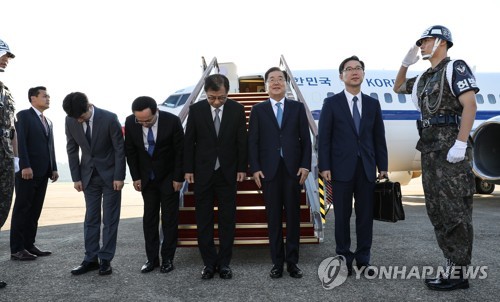South Korean President Moon Jae-in's special envoy headed to North Korea on Wednesday for talks on a proposed summit between Moon and North Korean leader Kim Jong-un, as well as ways to move forward stalled talks on ridding the North of its nuclear weapons.
Chung Eui-yong, head of the presidential National Security Office, left Seoul's Seongnam Airport, along with four other delegates including National Intelligence Service Director Suh Hoon and Vice Unification Minister Chun Hae-sung.
The same five members visited Pyongyang on March 5-6 for a meeting with North Korean leader Kim Jong-un that eventually led to the historic summit between Moon and Kim in the border village of Panmunjom on April 27, followed by a meeting between U.S. President Donald Trump and the North Korean leader in Singapore on June 12.
Their trip to Pyongyang is aimed at making arrangements for what would be a third Moon-Kim summit. The leaders of the divided Koreas held their second bilateral summit in Panmunjom on May 26. The countries have agreed to hold the third Moon-Kim summit in Pyongyang this month.
"First, the delegation will seek to set a specific date for the South-North summit that the countries have already agreed to hold in Pyongyang in September," Chung told a press briefing Tuesday.
"Second, it will discuss ways to develop South-North Korean relations by implementing the Panmunjom Declaration," the top security adviser to Moon added.

The South Korean officials will also seek to remove an apparent stumbling block in denuclearization talks between the United States and North Korea.
"The special delegation also plans to hold discussions on ways to completely denuclearize (the peninsula) and establish lasting peace on the Korean Peninsula," Chung said.
Denuclearization talks between the U.S. and the North seemed to reach an unprecedented level following the historic U.S.-North Korea summit in June.
The talks, however, have stalled after Trump called off a scheduled North Korea trip by his Secretary of State Mike Pompeo, citing a lack of progress in North Korea's denuclearization process.
Chung, who said he will be delivering a personal letter from Moon to Kim, noted he may also convey the United States' stance to the communist North.
"We are always closely communicating with the United States. We are also sharing information related to the visit by the special delegation to North Korea and holding close discussions," he has said.
Chung's trip comes amid concerns over a possible discrepancy between the speed of development in inter-Korean ties and progress in denuclearization efforts, especially following a third Moon-Kim summit.
Many in South Korea and the U.S. believe any development in the South-North Korean relationship followed by increased economic cooperation between the two Koreas may weaken or even remove the North's need or willingness to denuclearize in exchange for security guarantees, as well as economic support from the United States and its allies.
In a telephone conversation with President Trump held late Tuesday (Seoul time), Moon said improvements in inter-Korean ties will only assist efforts to denuclearize the North.
"(Moon) insisted that an improvement in the South-North Korean relationship and reduced tension on the Korean Peninsula will contribute to complete denuclearization of the Korean Peninsula and establishment of permanent peace on the Korean Peninsula," Cheong Wa Dae spokesman Kim Eui-kyeom said of the Moon-Trump talks.
Chung said an improvement in inter-Korean relations may even help salvage the stalled denuclearization negotiations between the U.S. and the North.
"We believe development in South-North Korean relations may be a force driving the denuclearization of the Korean Peninsula and that we may tow negotiations on the denuclearization of the Korean Peninsula through development in the South-North relationship if necessary," he said Tuesday.
The South Korean delegation is set to return home later in the day.
Whether the South Korean officials will meet the North Korean leader remains to be seen. (Yonhap)

